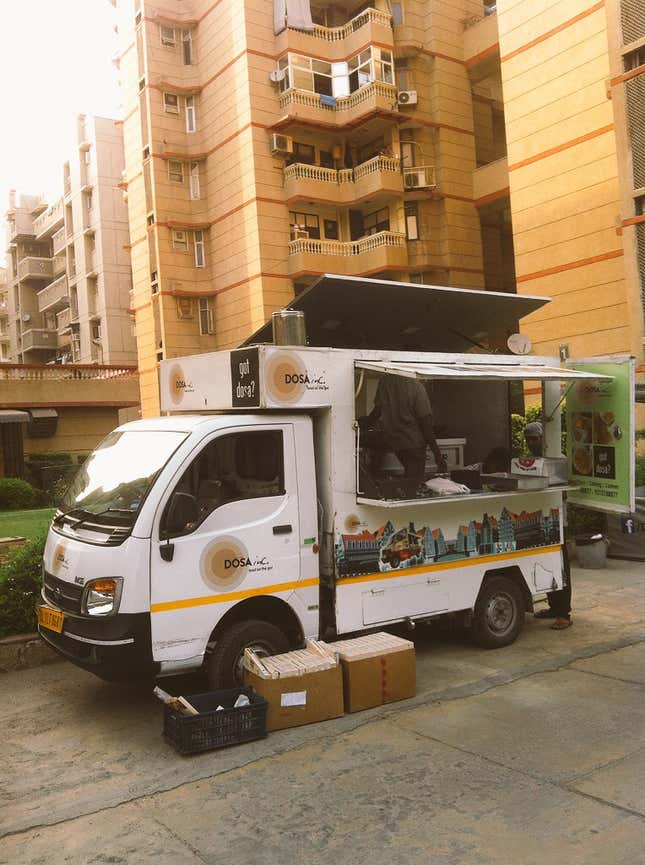The first time I called my food truck business a startup was in a brief that I sent to one of the better B-schools in Delhi to get some students to do a project with us.
It made sense. Our business was a new and exciting concept with great potential for scale, and my partner and I were professionals who were pursuing our dream. Our “startup” was a little over a year old and by then, it had iterated several times and started to look somewhat like what it does now.
The idea was simple: We would serve the familiar south Indian cuisine at the doorstep of the customer. On weekends, we would drive into gated communities, taking and serving orders. On weekdays, we would be in driveways of companies and office complexes or colleges. We were right there, super convenient and very compelling.

It worked. I got, if not a deluge, definitely a few smart kids interested in the project. It also opened the gates to a whole new world that we started seeing ourselves in. Friends were calling us “entrepreneurs” and talking about how they admired the fact that we were following our passion.
Suddenly, we were thinking about how many vehicles we would need, our current metrics, about branding—and most importantly about investors. Soon, interested folks were giving us their cards, telling us to call them if we were looking for funding. So, we worked on a business plan and an investor deck and picked up the cards and started calling.
Baby, talk is cheap
We called at random and it turned out that almost everyone we called early on were mentors. Cool, we thought, it could be helpful, maybe even useful.
We didn’t know it then, but being a mentor is the gluten-free diet of the investing world. Everyone was doing it. And more importantly, they believed they were qualified to do it. They felt not a moment of hesitation before they went on to tell us things that made no sense at all.
“Drop the vada,” said one. When we argued that it would be like telling McDonald’s to drop the fries, he said very knowledgeably that we were not McDonald’s.
“Experiment with your product, you are doing nothing new with your product!” But why? Our product was doing very well, and all our attempts at experiments on the other hand had bombed. People just wanted what we were selling. Isn’t that a good thing?
“These kids from IIT started such a fantastic concept. They have 300 outlets and have 100,000 orders per month!” Huh? We did the Math. It was 11 orders per day per outlet. In what universe was that fantastic? Oh wait, it made sense in the universe where you don’t question the “boys from IIT” and invest blindly. My bad.
We stopped accepting these cards.
The real deal
We separated the chaff from the wheat and called the real investors, the early stage ones who would be interested in the concept, the idea of building the business. We began sending out the business plan and soon we were on calls, putting on our suits, rushing to meetings. And with each call and each meeting, our business plan morphed and mutated, till we had no idea what we were doing—or why.
The business plans
V.1 was our vision. The numbers were raw around the edges. Assumptions, too, tethered to our present reality. It was honest and unappealing, clearly we needed to sex it up.
V.2-V.12 “Why lease trucks, buy them,” said an investor. Done.
V.12-V.20 “Using capital to purchase fixed asset is a complete waste.” These were really smart people. Obviously they know what they are talking about, even though they contradict one another. We won’t buy, we will lease.
V.15- V.25 “You should be able to do at least a 100 trucks for your business to make sense.” I snuffed out the doubts I had about expanding indiscriminately without knowing the market. I closed my mind to the images of the haunted and vacant restaurants I had seen so frequently in Delhi.
V.20-V.31 “Franchising is the only way to grow!” So, I researched revenue models of franchising and soon those numbers were in there.
V.41-V.38 “Franchising dilutes the brand.” Removed.
V.34-V.52 “We are a fund of some ungodly number of crores, 100 trucks are not enough.” Double it?
V.55-V.61 GDI (gross dosa index), a value created to make the business sound like it is prospering.
V.66-V.79 By now we were in Alice’s wonderland. Anything was possible. Fifth year valuation was a 100 times the first year valuation.
V.79- V.84 Not sure what business it is anymore, e-commerce? It is looking great though.
Enough with the tomfoolery
In June this year, after six months of the whole rigmarole, we shut it down.
Not the business, but the excel sheets.
We buckled down, expanded our staff, took up a larger kitchen space and began to gear up for the season. The season where we will make the most money. The season where most successful businesses make money, where they don’t need to go for another round of valuation to raise money to cover the losses on each transaction.
We are clear now. We will grow at the pace that the market can support and we can sustain. We will remain in business as long as we are making money and not just scale to be able to raise money. We have some busy and hard times ahead. We have lost sleep, we have little time with our families, but this is what it takes. We are a business, not a startup.
We welcome your comments at ideas.india@qz.com.
